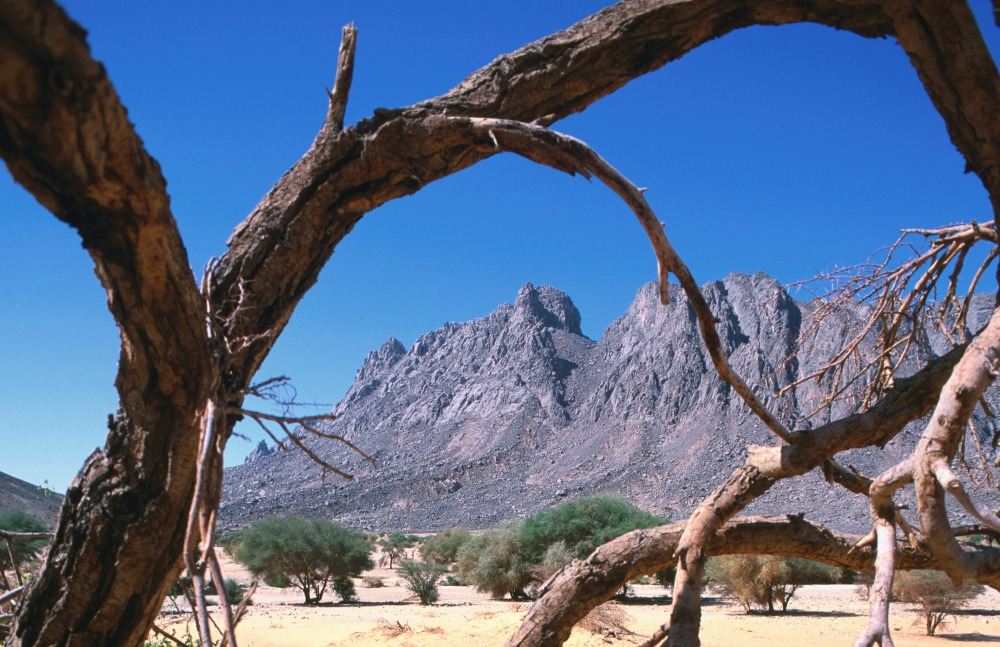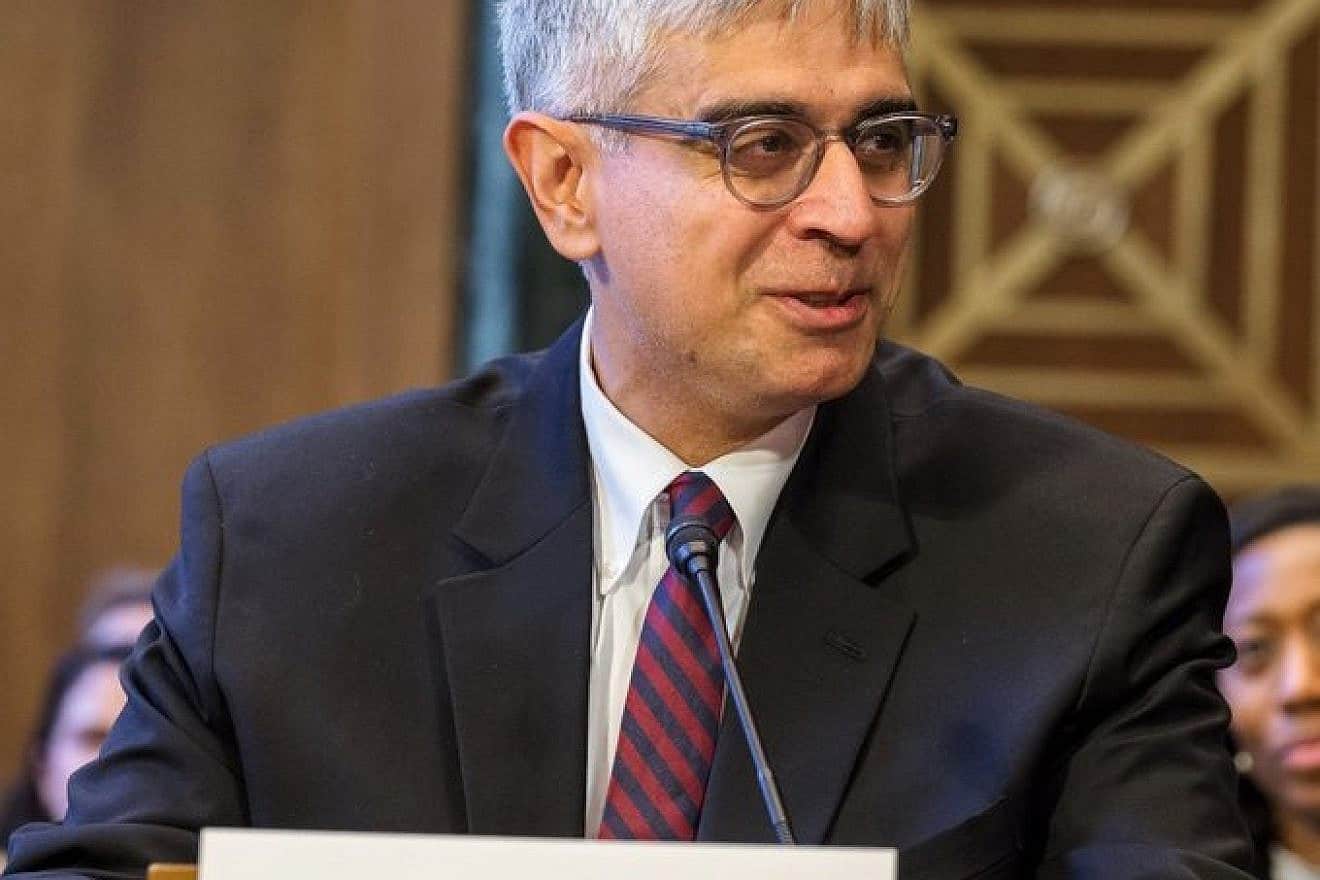 Czy region Sahelu w Afryce Zachodniej staje się nowym ośrodkiem międzynarodowego terroryzmu, tak jak pustkowia w Afganistanie były prawie trzy dekady temu? Na zdjęciu: góry Air na pustyni Tenere w pobliżu Agadez w Nigrze w regionie Sahelu w Afryce. (Zdjęcie: Frans Lemmens/Corbis via Getty Images)
Czy region Sahelu w Afryce Zachodniej staje się nowym ośrodkiem międzynarodowego terroryzmu, tak jak pustkowia w Afganistanie były prawie trzy dekady temu? Na zdjęciu: góry Air na pustyni Tenere w pobliżu Agadez w Nigrze w regionie Sahelu w Afryce. (Zdjęcie: Frans Lemmens/Corbis via Getty Images)
 Syndrom “Musimy coś zrobić”
Syndrom “Musimy coś zrobić”
Amir Taheri
Tłumaczenie: Małgorzata Koraszewska
Czy region Sahelu w Afryce Zachodniej staje się nowym ośrodkiem międzynarodowego terroryzmu, tak jak pustkowia w Afganistanie były prawie trzy dekady temu? W ubiegłym tygodniu pytanie to wdarło się do kręgów decydentów na całym świecie wraz z wojskowym zamachem stanu w Niamey, stolicy Nigru, zubożałego państwa w tym regionie.
Dowódca Gwardii Prezydenckiej gen. Abdourahamane Tiani aresztował “demokratycznie wybranego” prezydenta Mohameda Bazouma w pałacu prezydenckim i ogłosił się nowym władcą, kontynuując serię niedawnych zamachów stanu, które doprowadziły do rządów wojskowych w sąsiedniej Gwinei, w Burkina Faso i w Mali.
Dzwony alarmowe wywołane tym zamachem stanu przerwały letnie odrętwienie zachodnich kancelarii znajomym hasłem “musimy coś zrobić”, prowadzącym do typowych, pospiesznie podejmowanych działań.
Prezydent Francji Emmanuel Macron zrealizował hasło “musimy coś zrobić” przez nakazanie swoim 1500 żołnierzom stacjonującym w Nigrze przejście do stanu pełnej gotowości bojowej, podczas gdy jego ministra spraw zagranicznych, Catherine Colona, pośpiesznie zapewniła wszystkich, że Francja nie użyje siły, aby przywrócić swojego protegowanego Bazouma do władzy. Podobne zapewnienia nadeszły z Niemiec i Włoch, które również mają symboliczne siły zbrojne w Nigrze.
Administracja Bidena w Waszyngtonie, która od dawna twierdziła, że nie zaniedbuje Afryki, tak jak zrobił to Donald Trump, wykonała własny ruch z kategorii “musimy coś zrobić”, wysyłając pełniącą obowiązki zastępcy sekretarza stanu Victorię Nuland do stolicy Nigru Niamey na to, co opisała jako “ostrą, ale poważną”, (a w rzeczywistości bezużyteczną) rozmowę z kilkoma żołdakami.
Narody tworzące Wspólnotę Gospodarczą Państw Afryki Zachodniej również wykonały swoje “musimy coś zrobić”, wysyłając delegację wysokiego szczebla do Niamey, aby przekonać generałów, by byli dobrymi chłopcami i wrócili do koszar. Przywódca puczu odmówił spotkania się z nimi, a oni zareagowali postawieniem ultimatum, po którym zapowiedzieli, że skorzystają z opcji militarnej. Kiedy jednak termin ultimatum wygasł, powiedzieli, że woleliby opcję dyplomatyczną.
Ze swojej strony prezydent Rosji Władimir Putin też dokonał swojego “musimy coś zrobić”, każąc lokalnym agentom rozdawać rosyjskie flagi i koperty wypełnione pieniędzmi wśród wynajętych tłumów popierających zamach stanu w Niamey. Potem pojawiły się pogłoski, że Jewgienij Prigożyn, przyjaciel-wróg Putina, zadzwonił do generałów, by zaoferować wsparcie najemników z Grupy Wagnera, którzy zrobili to samo dla przywódców puczu w Mozambiku, Libii, Republice Środkowoafrykańskiej, a ostatnio w Mali.
Ale czy to wiele hałasu o bardzo mało?
Zachodnie wyrazy poparcia dla “demokratycznie wybranych przywódców” rzadko były czymś więcej niż tylko dyplomatyczną pozą. Samo przeprowadzenie wyborów nie zmienia społeczeństwa w demokrację. Nawet wtedy istnieje całkiem sporo demokratycznie wybranych niedemokratycznych przywódców. Przez dziesięciolecia Hissène Habré i Idriss Déby w Czadzie, dwaj z wielu podobnych władców, byli demokratycznie wybierani i wspierani przez Francję, a nikt nie próbował nazwać ich wzorami demokracji.
Zachodnia idea uniwersalnego modelu jest iluzją.
Przed erą kolonialną społeczeństwa afrykańskie decydowały o tym kto dzierży władzę przez wojny plemienne, a zwycięzca uzyskiwał prawomocność poprzez zwycięstwo. Potęgi kolonialne dzierżyły władzę poprzez połączenie siły, przekupstwa i kooptacji bardziej ambitnych lokalnych elit.
Wraz z konferencją berlińską w 1884 r. i podziałem Afryki mocarstwa kolonialne stworzyły sztuczne państwa niby narodowe zbudowane wokół lokalnie rekrutowanych jednostek wojskowych w służbie mocarstw imperialnych.
Po uzyskaniu niepodległości te nowe “narody” zawierały plemiona mające długą historię wzajemnej wrogości i mające niewielkie poczucie państwowości. Paradoksalnie to właśnie czasami opóźniona niechęć do kolonialnej przeszłości przekształca niektóre z tych krajów, w tym Niger, w państwa narodowe w mniej lub bardziej westfalskim znaczeniu tego słowa.
Po uzyskaniu niepodległości ta niechęć, lub ressentiment po francusku, prowadziła wiele nowo utworzonych państw afrykańskich do sowieckiej orbity podczas zimnej wojny. Ta opcja wygasła wraz z upadkiem ZSRR i ponad dekadą rosyjskiej niepewności co do własnej przyszłości. Pod rządami Putina Rosja próbuje odzyskać część utraconych wpływów, zwłaszcza w Afryce.
Czy Zachód powinien się tym martwić?
Niekoniecznie.
ZSRR nie czerpał żadnych korzyści z wydawania pieniędzy i prestiżu na wspieranie afrykańskich dyktatorów, którzy nadal mówili o socjalizmie, ale lokowali skradzione pieniądze w zachodnich bankach.
Dziś Rosja Putina ma jeszcze mniejsze szanse na lepszy wynik. Oprócz pszenicy i kukurydzy nie ma na sprzedaż nic, co Afrykanie chcieliby kupić, podczas gdy Afrykanie nie mają nic do zaoferowania, co Rosjanie mogliby chcieć kupić. Co gorsza dla Putina, Grupa Wagnera w wielu miejscach zwróciła lokalną afrykańską opinię przeciwko Rosji, w tym w Republice Środkowoafrykańskiej, Libii, Mozambiku, a ostatnio nawet w Mali.
Jeśli chodzi o rosnące zagrożenie dżihadem, pozwolenie Putinowi na prowadzenie walk w imieniu rządów afrykańskich może nie być złym rozwiązaniem. Francuzi walczyli z dżihadystami w Mali i nie dopuścili do wejścia do stolicy Bamako i przejęcia władzy tylko po to, by skończyć jako cel nienawiści tych samych władców, których uratowali przed zagładą. (Stany Zjednoczone miały podobne doświadczenia w Afganistanie, gdzie resztki reżimu “made in America” Hameda Karzaja i Aszrafa Ghaniego przewodzą teraz antyamerykańskiemu chórowi).
Budowa imperium od początku była złym pomysłem. Adam Smith ostrzegał przed tym w swojej książce The Wealth of Nations, gdzie wykazał, że praca niewolnicza i rynki zniewolone, choć przynoszą korzyści niektórym kapitalistom, są złe dla kapitalizmu jako całości, ponieważ fałszują zasady wolnego rynku.
Postkolonialna historia Afryki pokazuje, że przewroty wojskowe są najczęstszym sposobem zmiany rządów w prawie wszystkich krajach tego kontynentu. Wszystkie z 54 państw afrykańskich z wyjątkiem jednego doświadczyły co najmniej jednego udanego lub nieudanego zamachu stanu spośród 151 zamachów stanu, jakie miały miejsce na kontynencie od 1960 r. Jedynym wyjątkiem jest Republika Południowej Afryki. (Egipt miał swój zamach stanu w 1952 r.). [Jest jeszcze jeden wyjątek: Botswana. przyp. tłum.]
Próby narzucenia siłą zachodniego modelu zachodniej demokracji państwom afrykańskim nie powiodły się w co najmniej kilkunastu krajach. Sankcje też nie działają; zadają cierpienie najuboższym masom bez wpływu na rządzące kliki. Wiele lat temu odwiedziłem afrykańską “republikę” objętą surowymi sankcjami międzynarodowymi, by przeprowadzić wywiad z jej prezydentem. Kolacja, którą nam zaoferował, była iście pięciogwiazdkowa, podczas gdy mieszkańcy jego stolicy, zrujnowanej po krwawej wojnie domowej, umierali z głodu.
Przewroty wojskowe stanowią problem. Ale w przeciwieństwie do francuskiej iluzji kartezjańskiej, nie każdy problem ma gotowe rozwiązanie. A kiedy nie ma gotowego rozwiązania, mądrość radzi cierpliwość, pozwolenie ludziom na popełnianie błędów i uczenie się na nich, a nie teatralne gesty “musimy coś zrobić”, dyskredytujące tych, którzy je popełniają.
Zawartość publikowanych artykułów i materiałów nie reprezentuje poglądów ani opinii Reunion’68,
ani też webmastera Blogu Reunion’68, chyba ze jest to wyraźnie zaznaczone.
Twoje uwagi, linki, własne artykuły lub wiadomości prześlij na adres:
webmaster@reunion68.com




